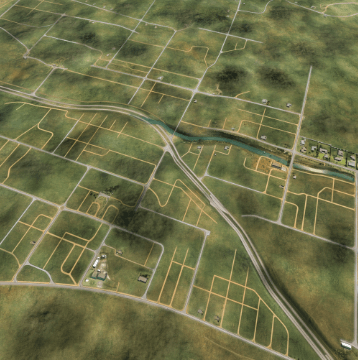Subdividing land in Basinger, Florida, is a smart way to maximize value, but it’s essential to understand the costs before jumping in. The average cost to subdivide land in Basinger, Florida, ranges from $2,000 to $10,000 per lot. Factors like survey fees, zoning requirements, and permits can influence this price, and every property has its own unique expenses. Steve Daria and Joleigh, celebrated real estate investors and trusted land buyers for cash, are here to guide you through the process. With their expertise, you’ll gain the insights needed to avoid common pitfalls while maximizing your investment. If you’re planning to subdivide for development, sale, or personal use, understanding the cost to subdivide land in Basinger, Florida, is a vital step. Take action today—book a free discussion with Steve and Joleigh to get tailored advice and make your property goals a reality!
Key Points
- Costs Can Vary Widely: The cost to subdivide land in Basinger, Florida, typically ranges from $2,000 to $10,000 per lot. Property size, local zoning laws, and the number of lots you plan to create can greatly influence the final expense.
- Permits and Surveys Are Essential: Before subdividing, you must secure permits and complete a professional land survey. These steps ensure the new lots meet county requirements and can be legally sold or developed.
- Zoning Laws Directly Impact Costs: Local zoning regulations determine how your land can be divided and used, possibly requiring additional procedures to comply. Adjusting to these regulations can sometimes increase costs and timeframes.
- Infrastructure Might Add Expenses: Additional costs may be involved if utilities such as water, electricity, or roads must be extended to serve the new lots. These infrastructure upgrades should be factored into your budget from the start.
- Experienced Guidance Makes a Difference: Working with experts like real estate investors Steve Daria and Joleigh can help you save time and money. They can provide tailored advice to help simplify the process while ensuring you maximize the value of your property.
What does it mean to subdivide land in Basinger, Florida?
Subdividing land in Basinger, Florida, means splitting a larger piece of property into smaller, individual lots that can be sold, developed, or used separately.
This process allows landowners to maximize the value of their property by creating multiple parcels, often increasing its usability and profit potential.
For example, a large plot might be divided into residential lots for building homes or smaller sections for agricultural or commercial purposes.

However, it’s not as simple as drawing lines on a map. Subdividing requires permits, land surveys, and compliance with local zoning laws to ensure everything is done legally.
It’s important to understand that the cost to subdivide land in Basinger, Florida, varies based on factors like property size, road access, and needed infrastructure improvements.
Landowners may also need to pay for utility extensions, road construction, or other upgrades.
While this can be a complex task, working with experienced professionals makes handling it much easier and ensures a smooth process.
Subdividing land is a great way to unlock your property’s full potential when done right!
Get Started: Get Your Cash Offer Below…
We are direct land buyers. There are no commissions or fees and no obligation whatsoever. Start below by sharing where your property is and where we can send your offer…
How can I find out if my land in Basinger is eligible for subdivision?
Determining if your land in Basinger is eligible for subdivision starts with checking its zoning classification.
Zoning laws determine how your property can be utilized, directly influencing its potential for subdivision.
You’ll also need to review your area’s minimum lot size requirements, as some locations have strict regulations about how small each subdivided lot can be.
Contacting the Okeechobee County Planning and Zoning Department is a great first step to gaining clarity on these rules.
A professional land survey is another essential step, as it maps out property boundaries and identifies any environmental or physical restrictions that may affect subdivision.
Additionally, you’ll want to investigate access to roads and utilities, as these services are often required before new lots can be approved.
It’s also important to factor in the cost to subdivide land in Basinger, Florida, since expenses like permits, surveys, and infrastructure improvements can influence your plans.
Partnering with experienced professionals who understand local regulations can make the process easier and help you decide whether subdivision is right for your property.
What factors influence the cost of subdividing land in Basinger, Florida?
- Property Size and Shape: The size and layout of your property play a big role in the cost. Larger or irregularly shaped plots may require more surveying and planning, which can increase expenses.
- Zoning and Permit Requirements: Local zoning laws and permits are critical factors. Meeting zoning regulations or applying for exceptions can add to the cost, as legal and administrative fees may be involved.
- Utility Access and Upgrades: If your property doesn’t have access to necessary utilities like water, sewer, or electricity, extending those services can be costly. These improvements are often required for approval of subdivision.
- Road Access and Infrastructure: Developing or improving roads to ensure proper access to each lot can substantially affect costs. Properties without existing roads may require significant investment in planning and construction.
- Environmental or Physical Restrictions: Features like wetlands, flood zones, or protected habitats can complicate the process. These restrictions often call for additional surveys or mitigation efforts, which lead to higher expenses.
What permits and approvals are required to subdivide land in Basinger?
To subdivide land in Basinger, Florida, you’ll need to go through a process that requires several permits and approvals to ensure everything complies with local laws.
First, you’ll need to apply for a subdivision permit from the local government, which is essential to start the process officially.
A land survey is typically required to map the property boundaries and any features that might impact the subdivision.
You’ll also need to check the zoning regulations to confirm the property’s intended use aligns with local rules.
If rezoning is necessary, this adds another step and may include public hearings or community input.
Environmental approvals are crucial if the property includes wetlands or other protected areas, as these can limit how the land can be divided.
Road access and utility extension plans often need approval to ensure each new lot is accessible and properly serviced.
Additionally, you may need to submit engineering or infrastructure plans if new roads or drainage systems are part of the project.
It’s important to remember that all these steps can influence the cost to subdivide land in Basinger, Florida, so that planning will save time and money.
Partnering with professionals familiar with the approval process can make the entire experience smoother.
How long does the subdivision process usually take in Basinger, Florida?
- Initial Zoning and Permit Reviews: The first step involves checking zoning laws and obtaining necessary permits, which can take a few weeks to a few months. Delays can happen if zoning changes or special approvals are needed.
- Land Surveys and Environmental Assessments: Conducting a detailed survey and reviewing environmental factors can take a few weeks to a few months. Timing often depends on the size of the property and any restrictions, like wetlands or protected areas.
- Designing and Approving the Subdivision Plan: Preparing the subdivision plan and getting it approved by local authorities can take one to three months. Review boards may request revisions, which can extend the process.
- Clearing Legal and Utility Requirements: Arranging utility access and ensuring legal compliance can take several weeks or longer. If utilities need to be extended or new roads added, this step might take additional time.
- Final Approvals and Recording: Once all requirements are met, final approvals are obtained, and the subdivision is recorded with the county. Depending on how quickly all paperwork is processed, this step can take a few weeks.

What steps do I need to take to start the subdivision process in Basinger, Florida?
To start the subdivision process in Basinger, Florida, the first step is to review your land’s zoning classification to ensure subdivision is allowed.
If the zoning aligns, you must hire a professional land surveyor to map the property boundaries and identify key features or restrictions.
Next, check with the local government for subdivision permits and gather information on additional requirements, such as road access, utility extensions, or environmental reviews.
Preparing a detailed subdivision plan is essential, as this will outline how your land will be divided.
Submit this plan to the local planning board for approval, which may require addressing community feedback or design changes.
You’ll also need to ensure all legal requirements, like title clearance, are met before proceeding.
Remember, all these steps can impact the cost to subdivide land in Basinger, Florida, so it’s wise to budget carefully.
If you’re unsure about the process or looking for a smoother path, contact Steve Daria and Joleigh.
They are seasoned real estate investors and land buyers for cash who can guide you through the process or even purchase your property directly, saving you time and effort.
Contact them today for expert advice and personalized assistance!
**NOTICE: Please note that the content presented in this post is intended solely for informational and educational purposes. It should not be construed as legal or financial advice or relied upon as a replacement for consultation with a qualified attorney or CPA. For specific guidance on legal or financial matters, readers are encouraged to seek professional assistance from an attorney, CPA, or other appropriate professional regarding the subject matter.
